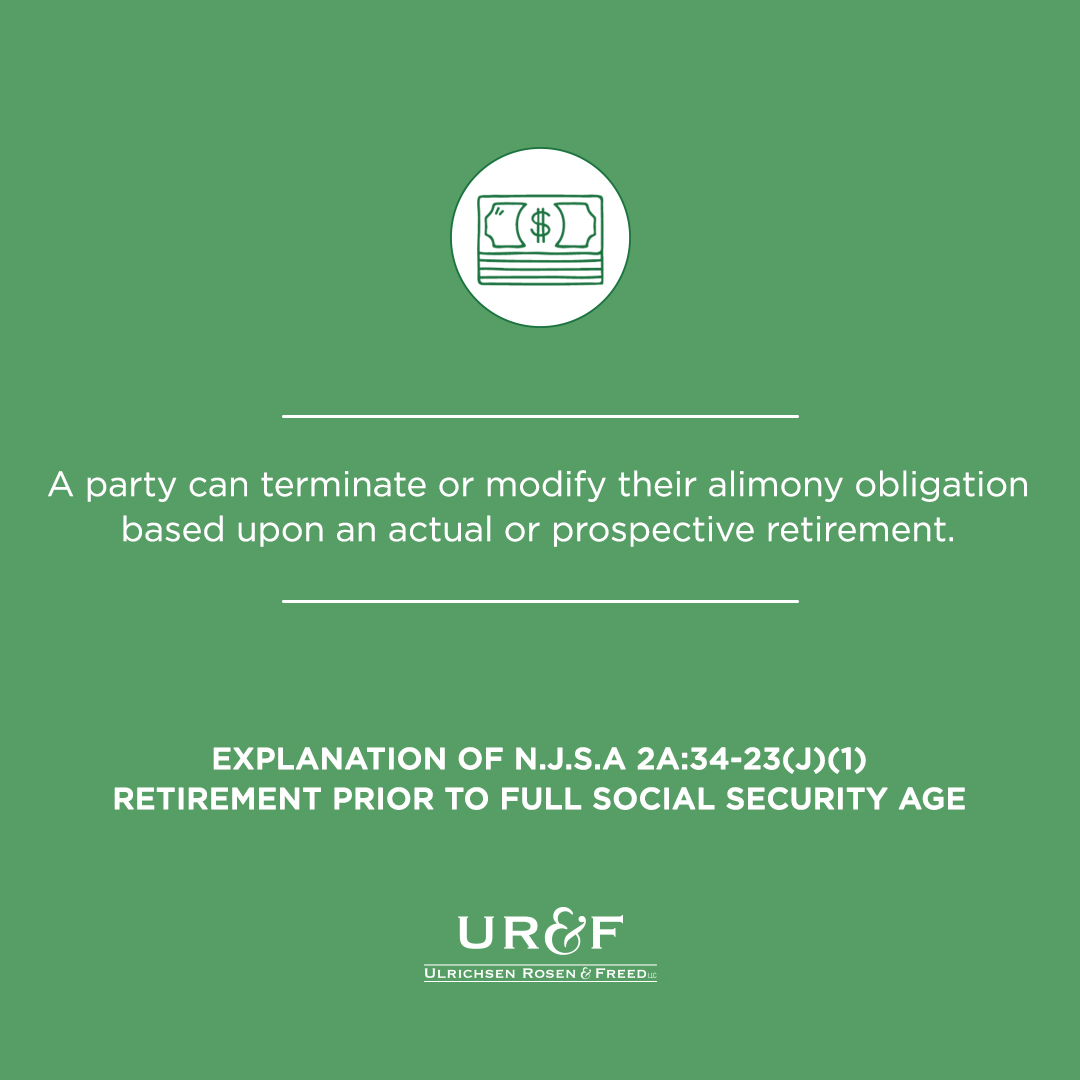Explanation of N.J.S.A 2A:34-23(j)(1)
A party can terminate or modify their alimony obligation based upon an actual or prospective retirement. N.J.S.A 2A:34-23(j)(1) governs the effect of retirement on final alimony awards entered after September 10, 2014.
Pursuant to N.J.S.A 2A:34-23(j)(1), there is a rebuttable presumption that an individual’s alimony obligation will end upon attaining full retirement age, which is defined as “the age at which a person is eligible to receive full retirement for full Social Security retirement benefits under section 416 of the federal Social Security Act.” Landers v. Landers, 444 N.J. Super. 315, 322 (App. Div. 2016) citing 42 U.S.C. § 416.
Per N.J.S.A 2A:34-23(j)(1), there is a rebuttable presumption that an individual’s alimony obligation will end upon attaining full retirement age. This means that the obligee has the burden to demonstrate why the alimony should continue. It is important to note that the presumption is a rebuttable presumption. As such, the rebuttable presumption can be overcome if the Court, upon consideration of the following factors determines that a party’s alimony obligation should continue:
The ages of the parties at the time of the application for retirement;
- The ages of the parties at the time of the marriage or civil union and their ages at the time of entry of the alimony award;
- The degree and duration of the economic dependency of the recipient upon the payor during the marriage or civil union;
- Whether the recipient has foregone or relinquished or otherwise sacrificed claims, rights or property in exchange for a more substantial or longer alimony award;
- The duration or amount of alimony already paid;
- The health of the parties at the time of the retirement application;
- Assets of the parties at the time of the retirement applications;
- Whether the recipient has reached full retirement age as defined in this section;
- Sources of income, both earned and unearned, of the parties;
- The ability of the recipient to have saved adequately for retirement; and
- Any other factors that the court may deem relevant.
N.J.S.A. 2A:34-23(j)(1)
A full and complete version of N.J.S.A 2A:34-23(j)(1) is cited below:
(1) There shall be a rebuttable presumption that alimony shall terminate upon the obligor spouse or partner attaining full retirement age, except that any arrearages that have accrued prior to the termination date shall not be vacated or annulled. The Court may set a different alimony termination date for good case shown based on specific written findings of fact and conclusions of law.
The rebuttable presumption may be overcome if, upon consideration of the following factors and for good cause shown, the court determines that alimony should continue:
(a) The ages of the parties at the time of the application for retirement;
(b) The ages of the parties at the time of the marriage or civil union and their ages at the time of entry of the alimony award;
(c) The degree and duration of the economic dependency of the recipient upon the payor during the marriage or civil union;
(d) Whether the recipient has foregone or relinquished or otherwise sacrificed claims, rights or property in exchange for a more substantial or longer alimony award;
(e) The duration or amount of alimony already paid;
(f) The health of the parties at the time of the retirement application;
(g) Assets of the parties at the time of the retirement applications;
(h) Whether the recipient has reached full retirement age as defined in this section;
(i) Sources of income, both earned and unearned, of the parties;
(j) The ability of the recipient to have saved adequately for retirement; and
(k) Any other factors that the court may deem relevant.
If the court determines, for good cause shown based on specific written findings of fact and conclusions of law, that the presumption has been overcome, then the court shall apply the alimony factors as set forth in subsection b. of this section to the parties’ current circumstances in order to determine whether modification or termination of alimony is appropriate. If the obligor intends to retire but has not yet retired, the court shall establish the conditions under which the modification or termination of alimony will be effective.
N.J.S.A 2A:34-23(j)(1)
For questions regarding modifying alimony obligations, retirement or any other family law related issue, please contact the attorneys of Ulrichsen Rosen & Freed LLC. Our firm is focused exclusively on the practice of family law and serves clients throughout New Jersey including clients residing in Mercer County, Somerset County, Hunterdon County, Burlington County and Middlesex County.


